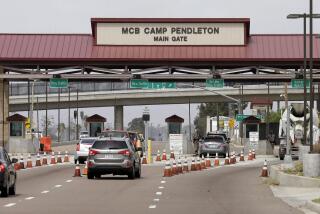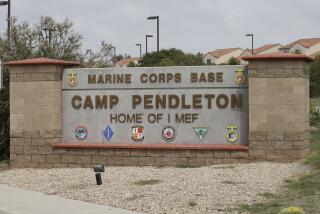Pint-Size Grunts Get a Dose of Camaraderie
- Share via
CAMP LEJEUNE, N.C. — Marine Capt. James Jones stared down at the nervous private wearing new camouflage and a worried look.
The 10-year-old had forged his mother’s name on school papers, an act of disrespect that Jones wouldn’t tolerate. He ordered the boy to remove his stripes and stripped the crying child of his rank.
Welcome to the Camp Lejeune Young Marines, one of 220 chapters in a 45-year-old group that teaches discipline and respect using the Marine Corps model. Many of the children here, a mix of boys and girls between 8 and 18, have parents serving in Iraq. Others are from civilian families.
“When their father’s away, they just kind of rebel,” said Michelle Tehas, whose husband shipped out in January. “I wanted them to do something.”
The kids meet at a Camp Lejeune gym for 2 1/2 hours most Wednesday nights, with fund-raisers and camping trips on the weekends. Jones, the group’s commanding officer, has become a surrogate father to many of the 75 or so children in his unit, about half of whom have Marines as parents.
The kids proudly wear camouflage uniforms, pant legs tucked in their boots and sleeves neatly rolled. They divide their meeting time between exercise and academics.
The other day, as Jones quizzed them about military history, he seemed part stand-up comedian and part taskmaster. He paced inside a circle of about 35 children, and those who believed that they knew the answers stood to reply.
If they hope to rise in rank, the pint-sized grunts must understand basic civics and learn the names of famous Marines such as Chesty Puller and Archibald Henderson. “Sir” or “ma’am” end every answer to adults or fellow Young Marines of higher rank.
The minimum age to join is 8. Cindy Rabidou’s oldest son badgered her for a year before his eighth birthday to let him join; he has been a member for 4 1/2 years, and his younger brother joined about two years ago.
“I was all for it,” Rabidou said. “I like the structure. I like the encouragement. I like the fact that because Dad’s a Marine and he’s not always here, there’s that male contact.”
A group of about 20 “recruits” joined the unit about a week ago, lining up in blue jeans and T-shirts under the direction of Master Gunnery Sgt. Andrew Davis, a 30-year veteran and former drill instructor. They were taught to stand at attention, line up in military formation, and respond quickly, courteously and loudly when called upon.
Davis also gave them a taste of military sarcasm.
“How’d you get picked?” he asked Stephanie Mejia, 13, who was chosen to lead the recruits through drills.
“Sir, I don’t know, sir,” she shouted in reply.
“Neither do I,” he said.
He cautioned an 8-year-old to lose a stick-on tattoo and threatened to trim the mohawk hairdo of another boy.
“Don’t make me get my field knife,” he said. “That’s got to go.”
Jones assured parents and visitors that the goal is not to intimidate or indoctrinate the children.
“This program is not designed to make your son or daughter a Marine, sailor or whatever,” said Jones, who has sent three of his four children through the program. He said he believes that it helps them become respectful, responsible and fit.
“This is about teaching,” he said. “This is about mentoring.”
Throughout the evening, Jones took children aside to talk. He had good-natured exchanges with some of them, and relied on older members and military volunteers to do the same.
“We use the military lifestyle and their core values to pressure them into good things,” said Thomas Eggenspiller, 16, the highest-ranking member of the unit and the 2002 National Young Marine of the Year.
Thomas, a sophomore at Jacksonville High School, is the son of a former Marine. He plans a military career after completing college. His mother, a member of a National Guard military police unit, was called to active duty at Ft. Bragg in January.
Jones makes it clear that he doesn’t intend to replace parents, only help them. Sometimes, he knows that it means making little boys cry by taking away something they’ve worked hard for.
“It’s amazing how much these little pieces of plastic mean to them,” he said, gently shaking the young forger’s plastic stripes in his palm. “I’ll give them back to him in a couple of weeks, when he has his head on straight.”
More to Read
Sign up for Essential California
The most important California stories and recommendations in your inbox every morning.
You may occasionally receive promotional content from the Los Angeles Times.













